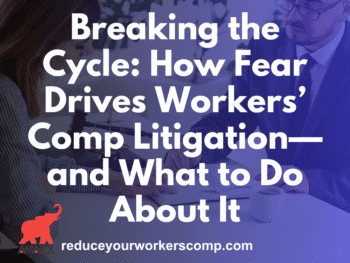The risk manager who only has to deal with the workers' compensation laws of one state is lucky in comparison to the risk manager who deals with the workers' compensation statutes of many states or all 50 states plus the District of Columbia, plus Puerto Rico, the Virgin Islands, Guam, etc.
It is virtually impossible for a risk manager to know the work comp statutes in all 50 states and U.S. Territories. There are many differences the risk manager needs to know, but there are just too many to discuss in one blog, so we will highlight a few of the more important key differences
Sources of Insurance
1. Insurance Carriers: In many states you can purchase workers' compensation insurance through an insurance carrier (we'll save the discussion of self-insurance for another time). The work comp insurance carrier provides the coverage you need to comply with the work comp laws of each state.
2. Monopolistic States: In states and two territories (Ohio, Washington, North Dakota and Wyoming, Puerto Rico and the Virgin Islands) you are required to purchase your work comp coverage through a state/territory operated fund. Your work comp carrier cannot provide your coverage in these states/territories.
3. Hybrid States: In 13 states (Arizona, California, Colorado, Idaho, Maryland, Michigan, Minnesota, Montana, New York, Oklahoma, Oregon, Pennsylvania, West Virginia and Utah), you have the choice of buying your work comp insurance through either an insurance company or a state operated fund competing with the insurance companies in the private market.
4. Your Company: TEXAS has a unique law allowing companies to opt out of carrying workers' compensation insurance with an insurance carrier. Your company becomes liable for paying all the work comp required benefits. This might be a good option for your company until you have a catastrophic injury claim, at which time you will wish you had transferred that risk to a work comp insurance carrier.
Who is Covered?
The quick answer is every employee. However, statement is not totally true. In some states if you are a sole proprietor or a partner, you can exclude yourself from coverage, but you still have to purchase work comp insurance for any employees who are not owners of the business.
A few states allow you to exclude commissioned sales people from your work comp insurance program, but before doing so, consider the potential cost of resolving their work related injury claims in the tort system of their states.
If your company is big enough to have a risk manager, you are not included in the companies excluded from work comp coverage based on size. While some states and territories require every employee to be covered for work comp, some states exclude very small employers from carrying work comp insurance. For instance, in Georgia, if you have fewer than five non-owner employees, you are not required to provide work comp coverage.
Many risk managers make the mistake of thinking they are covered for workers' compensation when they have listed all their employees with their work comp carrier. If it was only that simple. Most states require you to extend work comp coverage to all contractors and subcontractors who fail to provide their own work comp coverage. The consultant hired as a contractor to assist you with your business operation may not have his own work comp insurance. It is best to require any contractors or subcontractors working at one of your business locations to provide proof of insurance coverage to include workers' compensation coverage.
Occupational Disease
All states require work comp coverage for occupational diseases within their work comp statutes. Four states (Alabama, Arkansas, New York and Virginia) add to occupational diseases some ordinary life diseases, like arthritis, when they can be shown to be resulting from a work injury. Two states (Washington and West Virginia) exclude mental conditions or mental claims from occupational disease.
Administration of Work Comp Laws
There are almost as many different names for the governmental entities supervising work comp as there are states and territories. A few of the governmental names include: Workers' Compensation Division, Workers' Compensation Board, Division of Workers' Compensation, Industrial Commission, Board of Workers' Compensation, Workers' Compensation Commission and the Bureau of Workers' Compensation. The governmental entity of each state is responsible for the enforcement of their rules and regulations.
While most states have a system for resolving/litigating work comp claim disputes through their governmental agency, two states, Alabama and Tennessee, use their state court system to litigate work comp claim disputes. (workersxzcompxzkit)
Summary
The workers' compensation statutes are constantly changing as the individual states and territories tinker with their statutes. Keeping abreast of the ever-changing laws can be a full time job. There are various sources of information available to the risk manager both through the internet and through various publications. An excellent source of information on the workers' compensation laws of the various states is service provided by www.WorkCompResearch.com. It's a good way to have the information at your fingertips 24/7.
Podcast/Webcast: How To Prevent Fraudulent Workers' Compensation Claims Click Here http://www.workerscompkit.com/gallagher/podcast/Fraudulent_Workers_Compensation_Claims/index.php
FREE WC IQ Test: http://www.workerscompkit.com/intro/
WC Books: http://www.reduceyourworkerscomp.com/workers-comp-books-manuals.php
TD Calculator: www.reduceyourworkerscomp.com/transitional-duty-cost-calculator.php
WC Calculator: http://www.reduceyourworkerscomp.com/calculator.php
WC Books: http://www.reduceyourworkerscomp.com/workers-comp-books-manuals.php
TD Calculator: www.reduceyourworkerscomp.com/transitional-duty-cost-calculator.php
WC Calculator: http://www.reduceyourworkerscomp.com/calculator.php
Do not use this information without independent verification. All state laws vary. You should consult with your insurance broker or agent about workers' comp issues.
©2009 Amaxx Risk Solutions, Inc. All rights reserved under International Copyright Law. If you would like permission to reprint this material, contact Info@WorkersCompKit.com



























